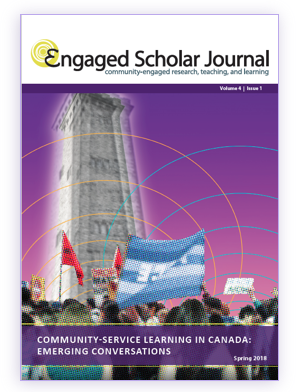Experiential Learning in Circles of Safety: Reflections on Walls to Bridges and Dewey’s Theory of Experience
DOI:
https://doi.org/10.15402/esj.v4i1.317Abstract
This paper discusses a Winnipeg-based community-university partnership structured as a set of interlinked “Circles of Safety” to support criminalized women while incarcerated and after their release. The four Circles include university, community, social co-operatives, and corrections; these circles contain the action research activities we are undertaking to provide greater safety for women transitioning from prison into the community. The motivation for our prison education program, which draws on the American Inside-Out Program and the newer Canadian Walls to Bridges Program, comes from these four directions and is energized by a belief in the human right to education. This paper argues that the success of both American and Canadian programs is explained by an approach to prison education that is complementary to John Dewey’s principles of educative experience, specifically principles based on continuity and interaction. Adapting and extending Dewey, the Circles of Safety model described in this paper maintains the value of experiential learning, which is defined as learning in situations that begin with the experience that the learners already have and subject matter that is within the scope of their ordinary life-experience, leading to their formation of purpose.
Downloads
Published
How to Cite
Issue
Section
License
Authors who publish with this journal agree to the following terms:
- Authors retain copyright and grant the journal right of first publication with the work simultaneously licensed under a Creative Commons Attribution License CC BY 4.0 that allows others to share the work with an acknowledgement of the work's authorship and initial publication in this journal.
- Authors are able to enter separate, additional contractual agreements for the non-exclusive distribution of the journal's published version of the work (e.g., post it to an institutional repository or publish it in a book), with an acknowledgement of its initial publication in this journal.
- Authors are permitted to post their work online (e.g., in an institutional repository or on their website) after the publication of their work in the Engaged Scholar Journal.
- Please note that while every opportunity will be taken to ensure author participation in the editing process, due to time constraints final copyediting changes may be made before publication to ensure APA adherence throughout all submissions.




